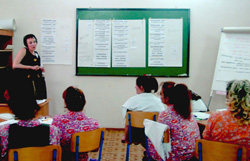You are here » Home » Telling Our Story
Success Story
Innovative HIV/AIDS prevention program changes lives
Preventing HIV/AIDS in Women’s Prison

| |
Photo: Intilish/Dmitry Subotin
|
|
Tatyana Nikitina leads a training session at the prison.
“I saw that the training helped women prisoners believe that life continues and that they can help prevent others from being infected with HIV/AIDS,” said Tatyana Nikitina, the director of an organization that works to prevent the spread of HIV/AIDS.
|
A number of USAID programs have been increasing HIV/AIDS awareness among medical professionals, community leaders, students, and educators in Uzbekistan. After participating in one of these programs, Tatyana Nikitina, the director of a community organization, approached USAID to help her group conduct a training course for an often-overlooked group — prisoners. The purpose was to curb the spread of HIV/AIDS among prison populations by training volunteers to teach others about prevention.
Twenty-two female prisoners and four prison officials participated in the program. They learned about prevention techniques and gained skills and materials for disseminating HIV/AIDS awareness information to other prisoners. Participants learned about the need to reduce stigmatization of HIV-positive prisoners, availability of anti-retroviral therapy, and methods for providing support to HIV-infected individuals. Because about 20 percent of female prisoners are HIV-positive and many are former drug users, it is critical that they are educated about HIV/AIDS and learn healthy, safe behavior that they can continue after their release from prison.
After completing the training, prisoners established an HIV/AIDS support group and trained an additional 12 volunteers to conduct awareness campaigns. The participants also organized an information desk in each of the 11 cell blocks within the prison. In June 2004, participants organized a theatrical-educational performance for more than 400 prisoners. A number of participants say they intend to continue HIV/AIDS prevention activities after their release.
Thanks to support from USAID and the President’s Emergency Plan for AIDS Relief, Ms. Nikitina continues to work on HIV/AIDS prevention activities and is now developing a series of trainings on HIV/AIDS prevention for male prisoners in Uzbekistan.
Print-friendly version of this page (403kb - PDF)
Click here for high-res photo
Back to Top ^ | 

